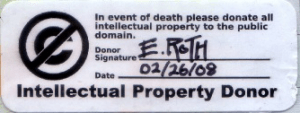 After a flat day last Wednesday, on Thursday, the stock market plunged 420 points on the Dow (-3.7%). During the same time, Eastman Kodak stock increased 44%.
After a flat day last Wednesday, on Thursday, the stock market plunged 420 points on the Dow (-3.7%). During the same time, Eastman Kodak stock increased 44%.
Did Kodak crush its earnings numbers? No, second quarter earnings were a negative $3.96 per share as revenue fell 4.5%. Perhaps they invented something as spectacular as George Eastman’s 1888 invention of photographic film?
What happened is that the Wall Street Journal reported that Kodak hired an investment banker to shop their patent portfolio. The 1,100 patents are estimated to be worth potentially $3 billion dollars compared to Kodak’s market cap of $820 million.
The patent system has strayed far from our Founding Fathers’ original intent: to spur innovation for society’s benefit by granting a temporary monopoly privilege to compensate for the risk therein. Instead, patents are increasingly used as spears and shields by large corporations to protect or extend their current interests.
What Happened?
Patents (inventors) and copyrights (authors) were enabled in the constitution:
The Congress shall have the power… To promote the progress of science and useful arts, by securing for limited times to authors and inventors the exclusive right to their respective writings and discoveries (Article 1, Section 8, Clause 8)
By lengthening the term and broadening the coverage, privilege has morphed into what is commonly referred to as intellectual property rights, or “IP”. Note that the Constitution makes no mention of intellectual property.
Privilege Becomes Property
A privilege is significantly different from property. Your driver’s license conveys the privilege to drive but drivers don’t own the roads.
A privilege is a shared right and responsibility. Your driving privilege can be revoked if you don’t drive safely. In contrast, private property is secured by an individual or entity to the exclusion of others. By expanding the time limits and breadth of patents, their monopoly value increases.
For example, patent’s now cover business processes, software algorithms and DNA (contested but not overturned by courts). Amazon’s one-click ordering process is patented. Is this an invention that “promotes science” such that as a society we want to prohibit other merchants from providing the same service to their customers?
The implication of patenting business processes is significant. At some point, it’s theoretically possible to patent every operating, financial and administrative business process such that one could lose the opportunity to improve the customer billing process without licensing the process from a competitor.
Extremist thinking? A so-called patent troll, Phoenix Licensing, is currently seeking millions from banks for allegedly infringing on the patent it holds to print marketing material on billing statements.
The Rise of Intellectual Property
As Lewis Hyde points out in Common as Air: Revolution, Art & Ownership, you would be seriously mistaken if you think that intellectual property has been a long standing pillar of American business. Until the late nineteenth century, the United States behaved much as many accuse China today.
American Francis Cabot Lowell visited British power looms with the specific intent of memorizing the design to install in a factory in Waltham, Massachusetts despite British laws that even prohibited mill engineers to emigrate. Until the late nineteenth century, the United States didn’t have much intellectual property to offer and therefore didn’t enforce copyright or patents vigorously.
The blossoming of United States industrial power coincided with the emergence of corporations. Patent ownership shifted from individuals to industrial corporations that now had aggregated sufficient knowledge to license and trade. About the same time, courts began to imbue corporations with the rights of individuals. This dramatically changed the patent life cycle and how abuse was punished.
Theoretically, corporations are immortal and their intellectual property assets can be reassigned indefinitely. For example, bankrupt Nortel recently sold its patent portfolio for $4.5 billion to repay creditors.
Corporations also have the strength to pursue lengthy lawsuits, particularly against individual inventors. Ford did just that for two decades against Robert Kearns, the inventor of the intermittent windshield wiper. And you can only fine a corporation – who’s going to send a CEO or CTO to jail for patent infringement?
Here’s the bottom line: The rise of intellectual property is a recent feature of our economy driven by the rise of corporations and technology. The original intent and privilege granted “to promote the progress of science and useful arts,” society has suffered.
Here’s a quick example of some of the consequences:
- Academic researchers refrain from promosing genetic research projects to avoid impinging on someone else’s gene patent. (Remember, no one invented DNA)
- The cost for start-up entrepreneurs to research increasingly broad existing patent coverage is become much more expensive and impedes raising capital.
- Can any patent office legitimately identify the invention path in a highly collaborative society while simultaneously allowing broader claims? Even then, can they do it in a timely fashion? (The current time frame from filing to issuance is 3 years and growing).
Patents Literally Suck Dollars Out of Innovation
According to many, Google paid $12.5 billion for Motorola to get its 17,000 issued and 7,500 pending patents. Since most patent disputes end in cross-licensing agreements, Google needed ammunition as nearly every competitor in the mobile space is engaged in a patent fight with someone else.
Google’s hand was forced two months ago when Nortel put its patent portfolio up for sale. After making a “stalking horse” bid of 900 million, Google lost to a $4.5 billion bid from Rockstar Bidco. Who is Rockstar Bidco? A coalition comprised of Apple, Microsoft, Research in Motion, EMC, Ericsson and Sony.
Just adding the cost of the Google acquisition, the winning Rockstar Bidco bid and Kodak’s patent portfolio valuation together and you get $20 billion. To put this in perspective, that’s nearly $2 billion more than NASA’s total budget. How many new development programs might $20 billion fund inside these same companies?
Does the “America Invents Act” Fix the Problem?
Having passed the House and the Senate, the America Invents Act is in conference and President Obama has indicated he will sign it. This is the first patent reform bill since 2000. The new bill’s major change is to award patents based on “first to file” rather than the current “first to invent”. This aligns the U.S. with most other developed countries. Those who work closely with young start-up companies are opposed because they see the change as greatly favoring existing companies.
Without going into the arguments for and against the bill, let me suggest the bill in no way returns patents and copyrights from property to privilege. And that’s where the greatest threat to innovation resides.
Innovation is about creating the future whereas managing property extracts maximum value from the past. We certainly should provide innovators with the privilege of extracting value for their creations but when the breadth, time and ownership extends so that it is treated as property, corporations naturally focus on extracting economic rents. Since these returns are more easily defined and secured, money that could fund the next cycle of innovation is diverted.
Losing Our Footing on the Shoulders of Giants
Sir Issac Newton spoke of his own inventions as having benefitted from standing “on the shoulders of Giants” that came before him. Innovation is increasingly collaborative such that it’s very difficult to identify where an original idea resides. As privilege expands into property, the shoulders of yesterday’s giants become unavailable.
We have heard many public figures argue that the route out of our economic hole is paved with innovation. Looking through the lens of today’s patent and copyright practices, the actions of Google, Kodak and others make sense. It’s easier and safer to harvest more wealth from yesterday’s thinking than break new ground.
As my Working Wider readers have heard me say before: Is this the future we want for our grandchildren?
Today’s patent practices may teach them how to beat their friends at Monopoly but I’d rather they create a new, new future that none of us can possibly envision. And let them have a temporary monopoly privilege for having done so.
And perhaps one of them might even be as daring as Jonas Salk, inventor of the polio vaccine who when asked who held the patent to the vaccine responded, “There is no patent. Could you patent the sun?”

 I'm Christopher Meyer - author of Fast Cycle Time, Relentless Growth and several Harvard Business Review articles.
I'm Christopher Meyer - author of Fast Cycle Time, Relentless Growth and several Harvard Business Review articles. 
“We are all compost for worlds we cannot imagine.”
— David Whyte (p. 9 of ‘Consolations’)